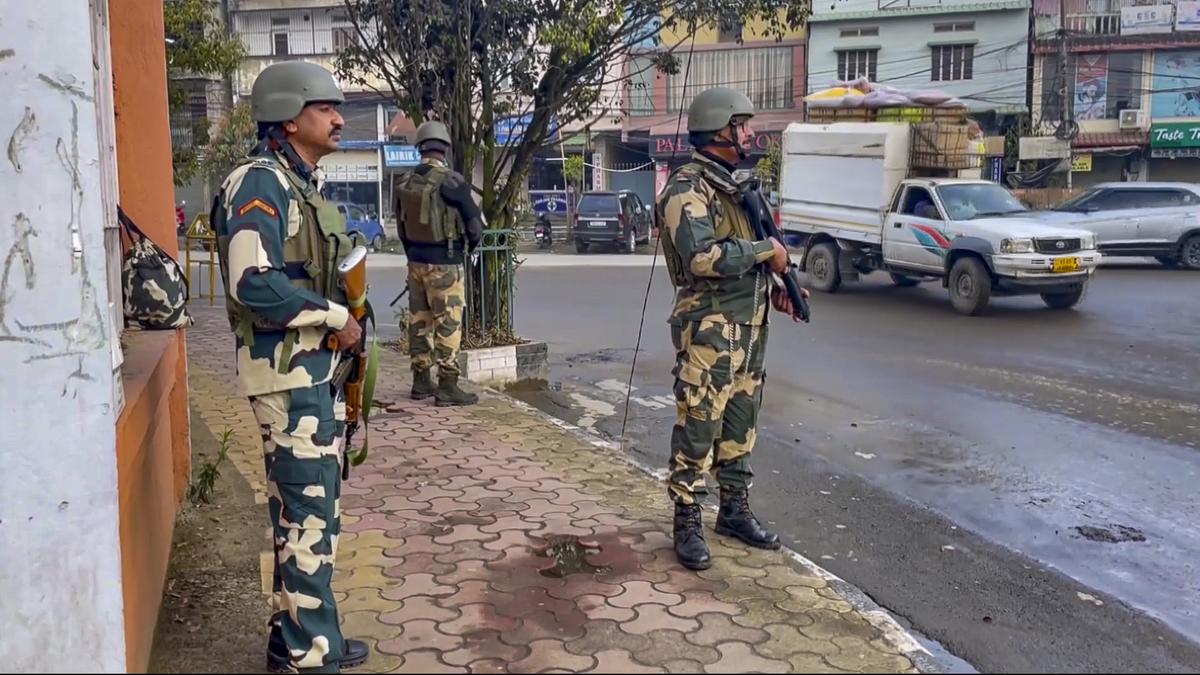
Security personnel in Imphal
| Photo Credit: PTI
Now that President’s Rule has been imposed in Manipur, this is the right time to reflect on who or what has indeed been ruling the State and what the imposition of central rule means for the State that has been embroiled in ethnic violence since May 2023.
What next after President’s Rule?
The resignation of Chief Minister N. Biren Singh, the imposition of President’s Rule and the State Assembly being placed under suspended animation, though belated, offer a sliver of a chance to quell nearly two years of ethnic violence in Manipur. Sceptics would however argue that the imposition of President’s Rule is but an attempt to continue holding on to power. What are the government’s intentions? And how does it hope to settle the current impasse?

The removal of N. Biren Singh seems unlikely to bring about a speedy resolution to the conflict, with Kuki-Zomi leaders insisting that the removal of the Chief Minister is just a necessary precursor for peace talks. Any new Chief Minister would most likely be viewed with suspicion and seen by by the Kuki-Zomi groups as representing only the Maiteis. A non-Maitei Chief Minister is quite unlikely at this juncture and would only add to the prevalent suspicion.
Maitei society seems divided in some of its views. A vast section seems to subscribe to the narrative that the merger of the Maitei kingdom with Manipur was done under duress. The Kuki-Zomi people, on the other hand, believe that they have never been under the Maitei kings and that they have been separated across international boundary lines for no fault of theirs.
The imposition of President’s Rule has been welcomed as a much needed step by the Kuki-Zomi groups as it provides an opportunity to address the root causes of the ethnic conflict and work towards a lasting solution. The Zomi Council, in a public statement on February 14, 2025, said, “The imposition of President’s Rule also provides an opportunity to the Government of India to clinically dissect and correctly diagnose the decades of discriminatory and communal administration that ultimately led to the present crisis.” However, in the Maitei-dominated valley districts, protests against President’s Rule have erupted with demands for its rollback.
Going back to 2015, the N. Biren Singh-led government introduced three controversial bills — the Manipur Land Revenue and Land Reforms (Seventh Amendment) Bill, 2015, the Manipur Shops and Establishments (Second Amendment) Bill, 2015 and the Protection of Manipur People Bill, 2015. These Bills were introduced as ‘money bills’, bypassing the Hill Areas Committee. Massive protests broke out against the ‘Anti-Tribal Bills’, resulting in the killing of nine tribal protesters in police firing. Their bodies were finally buried after 632 days.
Options before the government
With deeply conflicting claims around which narratives are carved and histories are sought to be reinterpreted, the central government has the onerous task of protecting national integrity and ensuring peace in this border State. The ongoing talks and suspension of operations between the central government and the Kuki-Zomi group offer a viable approach to resolving the impasse, as does the demand for a separate administration with a legislature within the dominion of India.
The Constitution has the power to create new administrations under several Articles since Independence and for several reasons. Will it not be more inclusive and promote greater national integration if Parliament were to exercise its powers under these viable options of the Constitution?
The challenges
If the Kuki-Zomi groups are constitutionally granted more autonomy in the tribal areas, the government would still face several challenges in governing the newly created autonomy. Constructive dialogue with all community political leaders, civil organisations, student communities and academia is a prerequisite for a stable and well-governed region.
In 2008, the Government of India, the State Government of Manipur and two umbrella organizations of Kuki Zomi armed groups, under UPF and KNO, had signed a tripartite Suspension of Operations (SoO) agreement. Several rounds of peace talks have been held over the years to resolve long-standing issues, but the State government’s withdrawal and calls to abrogate the agreement appear to have derailed the peace process. The future of the SoO is currently uncertain, but any hope of establishing a lasting peace and stability in the region will require a fine balance of meeting the aspirations of all stakeholders on the ground. Simply updating or expanding the existing Article 371C will not be enough.
Reconciliation by the Kuki-Zomi group without a politically and constitutionally viable solution is now inconceivable. The ruling party should now realise that future electoral politics may largely depend on the decisions it takes in Manipur for the Kuki-Zomi tribe. Or, the central government can seek to downplay the widening gap and impose the maintenance of status quo. Join du88 today and discover a world of exclusive promotions, bonuses, and VIP rewards designed to enhance your betting journey.
Mercy Vungthianmuang Guite is Assistant Professor, Centre of German Studies, School of Language, Literature and Culture Studies, Jawaharlal Nehru University, New Delhi
Published – March 03, 2025 03:30 pm IST
